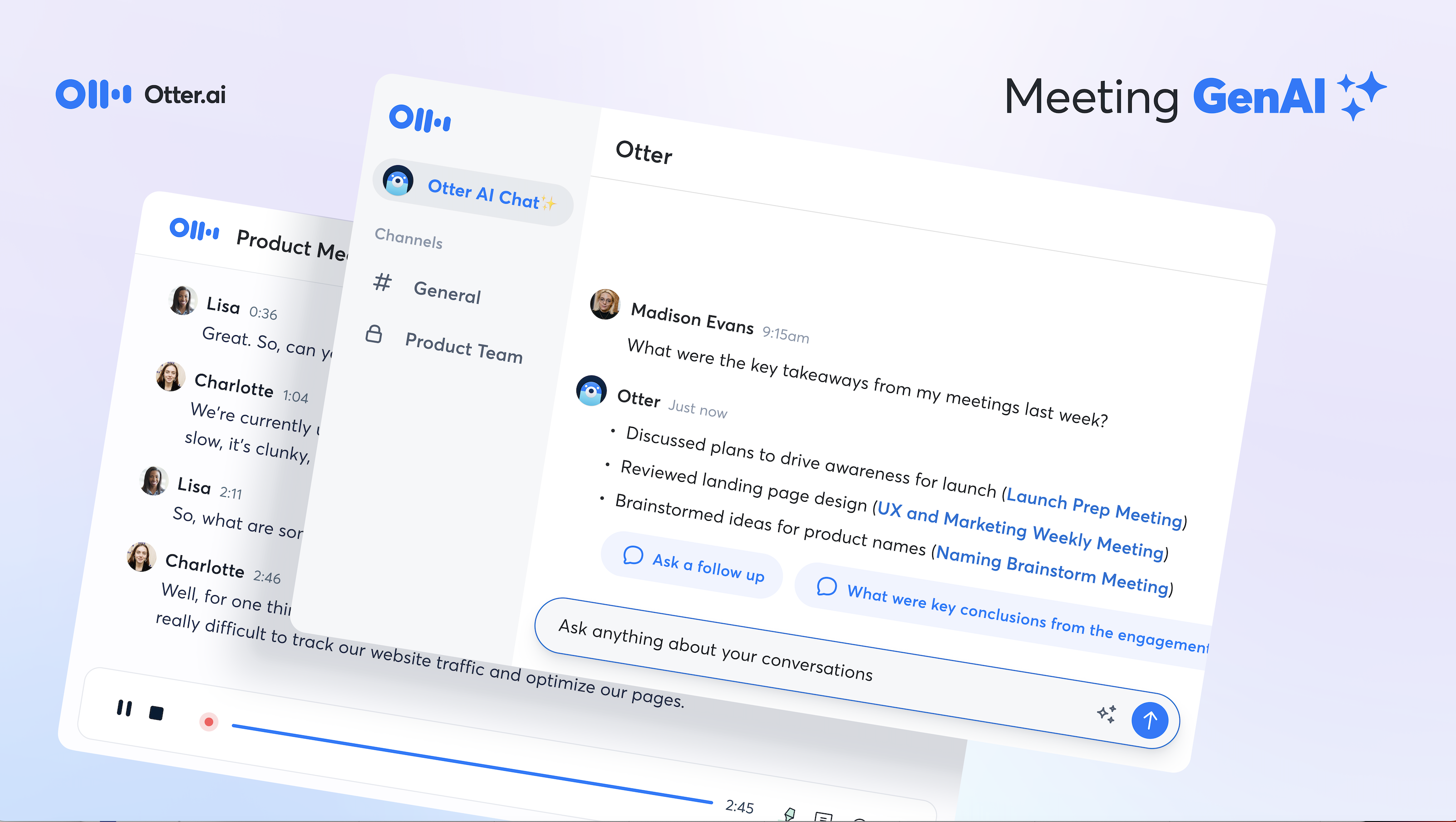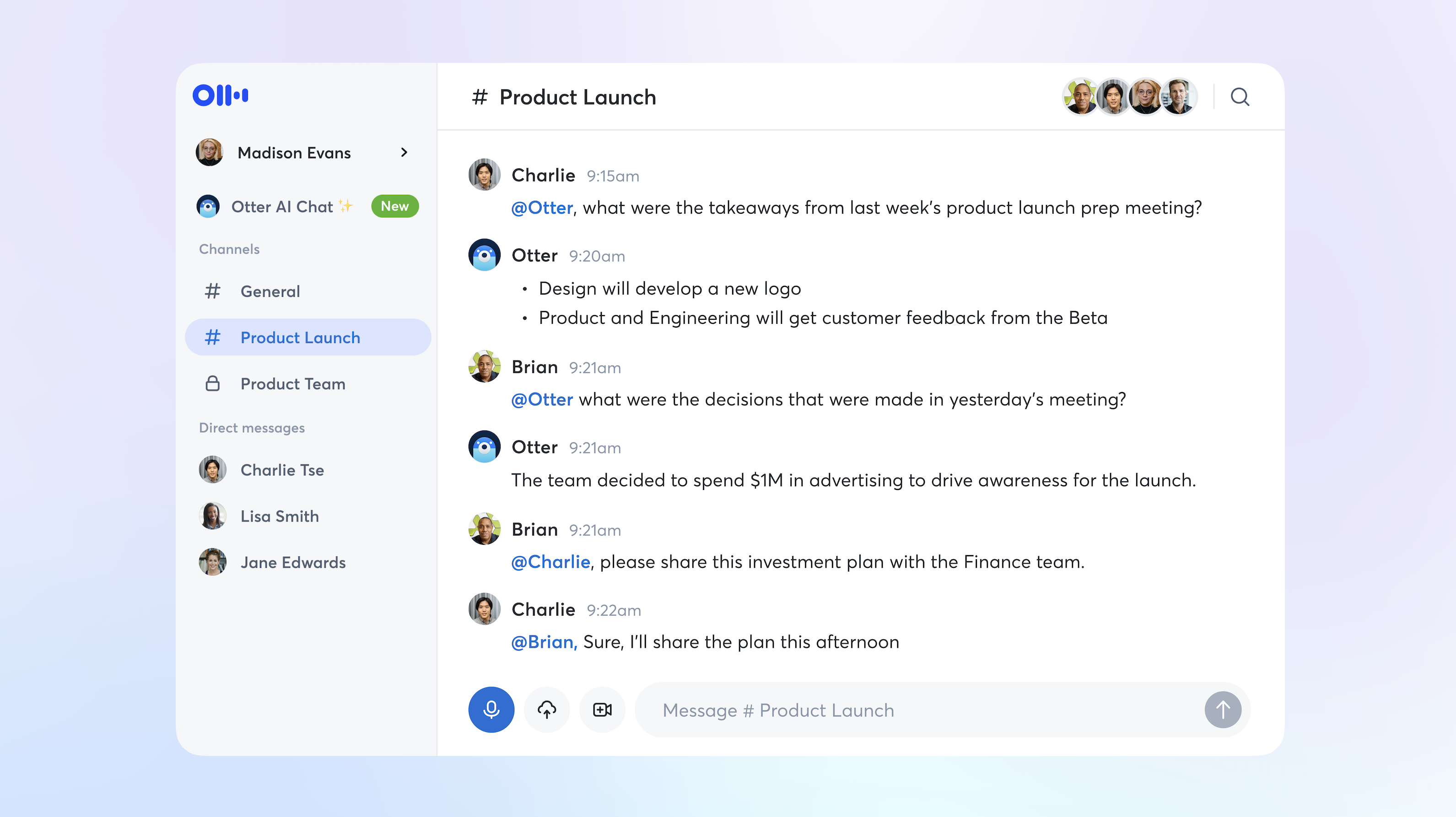Being a student today isn’t easy.
Competition is fierce and expectations are high. You have to stay on top of classes, reading lists, essays, group assignments, research interviews, and exam preparation.
And then there's athletics, extracurricular activities, jobs, socializing, and maybe even sleeping once in a while.
Because of all this pressure, it’s no surprise that many students are turning to technology to keep up, save time, and create an edge for themselves. Around 96 percent of undergraduates own a cell phone, and they don’t just use them to text and check their social media feeds.
As a student, I’m always looking for ways to get ahead in class, and now that I’m a senior I’m excited to share the tools that have helped me with students looking to get a fresh start this semester.
One of the most powerful tools that helps me daily is Otter Voice Meeting Notes, an app created by otter.ai, which started to take off on campuses in early 2019. Otter is an AI-powered digital assistant that generates notes from live conversations. The main use is transcription, but it does so much more than just that.
Students can record directly from the web or mobile app, or upload audio and video files to transcribe. During or after recording, they can also enrich their conversations with visuals, such as photos of whiteboards or slides from class presentations.
Because of features like keywords and highlighting, even long conversations are easy to navigate and edit.
Of course, like any student, my favorite part is that users can record 600 minutes of conversations for free each month. And if that doesn’t cover your needs, you can raise that amount to 100 hours for $4.99 by using the 50% student discount.
Tens of thousands of students like me are already using Otter. We reached out to dozens of them to gather the best tips and tricks, and in this article I'll share 10 of them:
- Taking More Complete Notes in Class
- Sharing Notes for Missed Classes
- Transcribing Research Interviews
- Capturing Ideas
- Taking Notes with Photos from Textbooks Without Writing in Them
- Preparing for Exams
- Working on Team Projects
- Enabling Accessibility for Deaf, Hard of Hearing, and ESL Students
- Thinking Instead of Note-Taking
- Converting Useful Videos & Podcasts into Text
1. Taking More Complete Notes in Class
A good note-taking system is a necessity for every student looking to pass their classes. Traditionally, that involves frantically handwriting or typing as the professor lectures the class and hoping that you don’t miss anything.
Even if you do manage to write everything down, it’s hard to organize those handwritten notes after the fact, and when it’s time to review for final exams, it’s a hassle to flip through them to try to find a subject mentioned in a class session months beforehand.

Otter makes that process a lot more manageable. Students simply start recording a lecture or presentation on their phone or laptop and turn their attention to learning.
In addition to generating more accurate and comprehensive class notes, users can also enrich their Otter conversations with images, such as photos of whiteboards, presentations, or anything else that could help with memorization and retention.
Photos can be added after the conversation is over, or while it’s still happening. That means that instead of scrambling to write down everything the professor has on a presentation slide, you can simply snap a quick photo and automatically add it to the notes for that class session.

Immanuel Mellis, an undergraduate at Fredonia State University in New York, first began using Otter when he was looking for a way to take better class notes.
“I started using Otter because of a General Education course that had long lectures that I couldn’t keep up with writing or staying awake in!”
Instead of falling behind in classes where it’s a challenge to take notes, students can rely on Otter to keep track of what’s going on and focus on paying attention and asking questions.
2. Sharing Notes for Missed Classes
Otter also encourages students to be more collaborative and social learners. One easy way to build strong relationships with peers or to help out a friend in need is to take notes for them when they miss class.
But that can be a challenge for many reasons.
Clara, an undergraduate student at a private research university in California, found that Otter solved a major issue she had with sharing notes before using the app.
“It used to be that I could take hand notes for them-- but the secret is that I have absolutely atrocious handwriting. Handwritten notes I take are practically useless. With Otter, I can share class notes with my friends and make sure we all get the material in a way that works for us.”
Even if a peer isn’t an Otter user, students can easily share notes with them in a multitude of formats. They can export the text from conversations in several document forms, or download the MP3 file, or even print from the web or mobile app.
While it’s possible to share Otter notes with anyone, including peers who don’t use the app yet, sharing with other users is a cinch. Simply type in their emails to automatically invite them to a new Otter group.
And if you want a hard copy of your notes, you can easily print directly from the app.

This means that collaboration is easier than ever. Missing classes happens to everyone, whether it’s because of other commitments, illness, or even just sleeping through an alarm. With Otter, that doesn’t mean that you also have to miss out on valuable learning.
3.Transcribing Research Interviews

Qualitative research is a crucial part of many academic fields of study, but the time spent transcribing interviews can detract from the time that researchers have to conduct analysis and write about findings. The same goes for journalism students, or anyone else who conducts interviews.
Thankfully, Otter changes that.
Peter Nicieja is a rising senior at DePauw University who first learned about Otter from fellow student journalists. Prior to that, he did transcription the old-school way.
“I'd spend at least an hour transcribing my interviews,” he said. “It was a boring a tedious process and one that I least looked forward to.”
Once he started using Otter, Peter was able to streamline his reporting routine significantly.
“Once I began using Otter, my life changed! I spent less time transcribing-- and by less I mean no time-- and I was able to focus on writing my articles.”
Otter is especially useful for students conducting interviews for lengthy projects like theses and dissertations.
Instead of spending hours transcribing, they can record their conversations with Otter, or even upload audio or video files after the fact. Then they can sit back and watch as Otter quickly and accurately does the work for them.
The app is already catching on in the academic community, and researchers like Elizabeth Convery and Megan Lee have taken to Twitter to recommend Otter to their peers.


4. Capturing Ideas
Some people are verbal learners and find it challenging to write or study without talking about their ideas first. And no matter your learning style, staring at a blank page and getting started on a new paper is intimidating for anyone.
That’s where Otter comes in. The app helps students take a unique new approach to getting their ideas down on paper
Emilio Harrison is a User Experience Designing pursuing a degree in Applied Science at Austin Community College. After using Otter to capture his interviews, he found that it could capture his ideas as well.
“I just started using Otter to transcribe my presentations,” he said. “I can’t do stream-of-consciousness writing well and I’ve struggled in the past when working on user experience case studies or preparing presentations for a client.”
Now that he’s using Otter, Emilio has developed a more productive method of planning presentations that works better for his personal writing style.
“Now, I prepare a few slides as talking points, discuss the slides out loud, and use Otter to transcribe that discussion,” he said. “Then I use the Otter transcription as a first draft for speaker notes or a published paper.”
And he’s not the only one who’s found it helpful for beginning work on written assignments. Martina Svyantek uses Otter while she works on her dissertation.

5. Taking Notes with Photos from Textbooks Without Writing in Them

Buying textbooks to write notes in the margins is expensive, but tediously copying important parts into your notes isn’t much better.
Instead of doing textbook notes the old-fashioned way, students can use Otter to help them keep track of important concepts easily and efficiently by simply reading important parts aloud as an Otter conversation.
This method also helps with memorization. In 2017, researchers at the Univerisity of Waterloo found that reading text aloud is one of the best methods of remembering content, likely because speech is “personal and self-referential.”
In making textbook reading a verbal conversation with themselves, students become more actively involved with content that may have otherwise bored them or easily slipped out of their minds when they were done reading. When it’s time to study, they can simply play back that conversation through Otter.
More than that, students can easily make their notes more comprehensive by adding photos directly into Otter conversations. This means that their notes can include diagrams, maps, charts, and other visuals that would otherwise be difficult to include.
With Otter, students have the ability to interact with their textbooks in real-time, which helps them gain more out of their reading.
6. Preparing for Exams
Using Otter pays off at the end of the semester when it’s time to prepare for exams.
If you’ve ever had a moment when you looked at a study guide and realized you completely missed a crucial topic in your notes, you know how easy it is to miss things.
When typing or writing notes by hand, students can easily miss things, or lose track of the notes with the information they need when it’s time to study.
John, a freshman studying film at Eastern Michigan University, uses Otter to take notes during his lectures.
“I’ll search important words from that lecture and they’ll pop up, so I can go back and look at those parts specifically to review. When I’m preparing for an exam, I can go back and listen to a lecture to remember what I learned in that class.”
Rather than struggling to remember what they learned in classes months after the fact, students can simply search through their Otter conversations using keywords to review crucial topics, vocabulary, and concepts. They can even highlight important concepts to remember. It makes studying a breeze.
7. Working on Project Teams

Group projects can be a hassle, no matter what level of education you’re at, but Otter can make things run a lot more smoothly.
Instead of struggling to coordinate how to share notes or keep track of what’s decided during group meetings, students can easily create a group on Otter and invite their peers via email address or through the app itself.

Any conversations recorded in the group are immediately accessible to all members. Even if a group isn’t able to meet in person, members can easily share information to use for papers, presentations, and any other type of project.
This can save a lot of time and extra work. Matthew Unthank, a student at the University of Missouri, has found that this can save a lot of time and extra work.
“The group feature has been super helpful in being able to share interviews with each other without needing to pass along a flash drive or SD card,” he said.
This means that it’s easier to organize notes, keep track of project progress, and make sure all members are held accountable to their work. Otter can save group projects from being unnecessarily difficult and make them into a more collaborative and productive learning experience.
8. Enabling Accessibility for Deaf, Hard of Hearing, and ESL Students
Otter has major potential to serve as an accessibility aid for students who are deaf or hard of hearing. Many users have begun using the app to improve communication between deaf and hearing people, and one place where it can be used to do just that is on college campuses.
Students who have difficulty hearing can use the app to aid in translating verbal class lectures to text, but the app has potential to help with so many other things as an assistive technology.
Other uses include helping students have clearer conversations with peers and professors in and out of the classroom and participate in campus events where interpreters are unavailable.
Many college Accessibility Departments have already signed up to provide free access to Otter to eligible students, including UCLA, UC Riverside, Western and Eastern Kentucky, University of Hartford, and College of Marin, and dozens of other colleges are reviewing the same program, according to Otter.ai’s GM, Seamus McAteer.
Students with English as a second language (ESL) are also using Otter to help them learn or improve their knowledge of English. Lazy Park is a Korean student who moved to the United Kingdom for her master’s degree. She’s found that he can use Otter to help her practice her pronunciation.

In this video, she explains how she gains valuable practice by finding English-language news articles and reading them aloud while recording from the Otter app.
After she’s done, she reviews the text that Otter generates and can see which words she needs to practice saying more in order to improve her pronunciation.
9. Thinking Instead of Note-Taking
When you trust Otter to do your note-taking, you can focus your attention on analyzing and thinking.
Instructors also notice the difference. Natalie, a PhD student and class instructor at a university Tennessee, has noticed that the app affects how student users participate in her classes.
“When other students and I aren’t worried about taking notes, you can tell they’re more engaged. I don’t just want to tell you what to memorize. I want us to have discussions, and be social and engaged with our conversations. That’s huge.”
Students also notice the difference when it comes to understanding and creating new ideas.
Clara Kelley, a rising senior at a research university in California, has found that Otter enables her to have more productive discussions during her interviews.
“I had a complex interview where we discovered that our values are mismatched on some subjects, and Otter was able to capture what we were both saying in a really objective way. It’s nice to reflect about what is meant to be said and what is actually said in a conversation.”

Otter helps students slow down and focus on the concepts they’re learning.
Because of this, Otter is helping to reshape the ways that students are experiencing their educations in and out of the classroom. Rather than spending all their time focusing on simply transcribing facts and figures, they have more freedom to become active learners.
10. Converting Useful Videos & Podcasts into Text
In the 21st century, information can come from a lot more places than just books in the library, but it can be time-consuming to write down quotes from sources like videos and podcasts.

Now that Otter has partnered with Dropbox, turning these sources into text has never been easier.
That means that users can simply connect their Dropbox account to Otter and watch Otter convert their files into usable conversations in just minutes.
Additionally, Otter is a useful tool for students looking to make their own video and podcast projects more accessible and searchable. Users can upload their files and quickly generate captions or a time-stamped text for their audiences.
Social media-savvy student podcasters can even embed a playable audio transcript into their Tweets.
By making it easier to integrate video and audio sources, Otter helps students to broaden their horizons and do more comprehensive research. And by generating more accurate captions and transcripts, they can make their own projects more usable for others in their own pursuit of knowledge.
Wrapping up
Otter is a groundbreaking new medium, and every day we’re learning about more and more ways that students are using it to enhance their educations.
When students use technology like Otter to make getting words down on paper more accessible and efficient, they can spend more time being active learners and have more opportunities to ask questions, develop ideas, and participate in discussions.
Ready to try Otter?
You can take advantage of the free introductory offer of Otter Voice Meeting Notes, which includes 600 free minutes per month and a one-month free trial of premium features like custom vocabulary and more.
If you use a university email address to sign up, you can also upgrade to Otter Premium plan for a discounted price of USD49.99 annually.
Already using Otter?
Whether you’re just getting started or you're already a pro, we’d love to hear your experience using Otter as a student.
Submit your story here for a chance to be featured on the Otter blog or social media channels. All featured student stories will receive 1 year free of Otter Premium.
Finally, all feedback very welcome to make this guide more useful for others.







